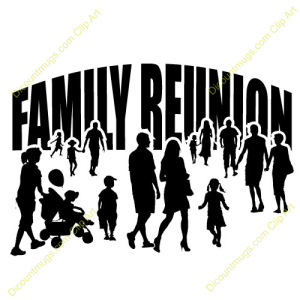
Today in this blog, I would like to talk to you about observing an
event that so many families have practiced through the years which is “Family
Reunions”. Many families have attended family
reunions, and as a result family members have connected closer with each other. It is important for us to know that, “Family
Reunions” can be a tool to help us build healthy and strong extended family
relationships. I believe participating
in family reunions is a way to bring families together. On May 23, 2015, I am proud to say I enjoyed
taking part and participating in two great family reunions. My family, the Jones - Stradford family, came
together for our 20th Cousins Round Up family reunion, and my wife’s
family, the Wallace family, came together for their first ever family
reunion. It was good seeing family
members over a happy occasion, instead of seeing them over a sad occasion at a
funeral.
As I stated family reunions have been practiced by many families
down through the years. In a Washington
Post article titled “The Family Reunion Trip: It’s All Relatives” written by
Gary Lee in January 2006, he wrote about Family Reunions in the African
American culture. Mr. Lee in his article
wanted to show how African American families participate and bond closer
together through family reunions. He focused
his report on a family named “The Fisher”.
The Fisher family history tracks back to descendants, by blood or
marriage, of Orange and Berry, two brothers born in the late 1800’s in
Lancaster County, S.C. In the late 1940’s
and 1950’s, the grandchildren began to migrate to New Jersey, and to other
parts north in search for better jobs.
The two brothers died in the 1950’s.
Their descendants have been meeting every two years since the late 1990’s. In fact when this article was written, their family
reunion was taking place in Atlanta, GA., where they had three-days of
celebrating as a family.
Focusing on our family, I had the privilege of talking to my cousin
Dwight who is the one that had the vision behind “The Cousin Round Up”. He shared with me the family reunion has been
going on for 25 years now, and from everyone’s feedback this year’s reunion was
the best. Dwight said everything started
with him in the 1980’s, when he noticed how we were losing our aunts and uncles
because of death. It was in 1990 when his
mom passed away. He mentioned that
whenever he would see family members, it was always at a funeral. Even though we would have a good time with each
other, it was always at a sad occasion over someone’s death. It was through this experience that “The
Cousin Round Up” was birthed through him in 1990. Dwight’s desire was that we would come
together as a family, and have a good time with one another at a good
occasion. He would supply the place for
the reunion, all we had to do was to come, bring our food, and have a nice time
together as a family. The reunion would
be held every two years around the Memorial Day holiday weekend. This year a committee was formed for the
reunion, and a family Facebook group page was created called “The Family of
Henry and Lula Jones”. It had a picture
of my Aunt Lula and Uncle Henry Jones, and all of their children, that dated
back around 1945-1947. I must say the
committee did a great job in making, “The Cousin Round Up” a pleasant
experience for us that are a part of this fantastic family.
For my wife’s family we would always get together over someone’s
funeral, so this year her family decided to have a family reunion. Even though their family isn’t as big as my
family, we had relatives coming from Georgia, and around our area. Their committee met and they work out things
to bring us together as a family, so we could continue to build good
relationships with each other.
It is important for us to do things that will keep us connected
together with our extended family, instead of allowing things to keep us
isolated from them. The good thing about
attending family reunions are, coming together and sharing our family stories
with other family members. Coming together and eating good food, along with
participating in different activities.
Also not allowing conflicts or problems to keep us separated from our
family. All of these things help draw us
closer together with each other. It has
been said “Friends come and go, but family is forever.” Family Reunions can be a tool to bring us
closer together as a family, and keep us connected to one another. Be intentional about participating in your
family reunion and build closer family ties with your extended family.

Would love to hear your thoughts, questions, or feedback.






















